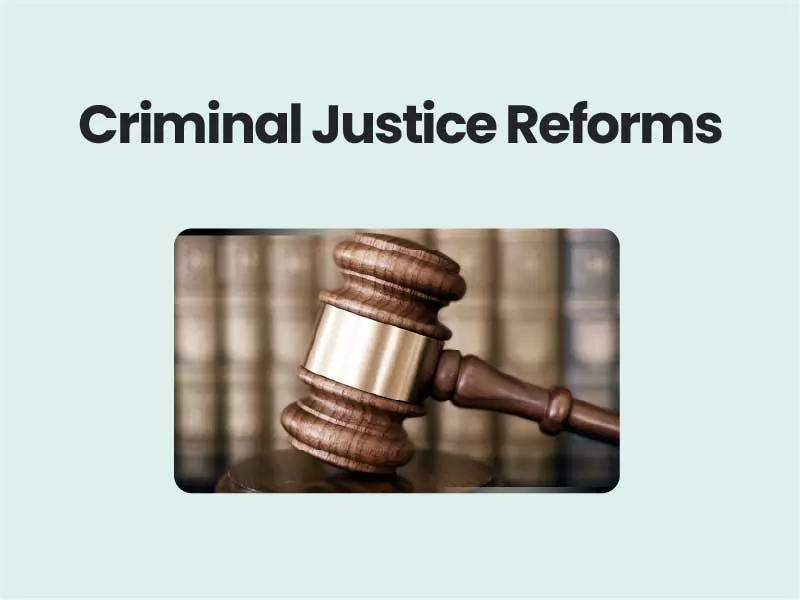Companion@360 → 7 Month programme to sharpen your writing skills → REGISTER NOW

Criminal Justice Reforms
Criminal Justice System in India is an age-old system primarily based upon the Penal legal system that was established by the British Rule in India.
It is established by a government to control crime in the country.
It protects the rights and personal liberty of individuals and the society against its invasion by others.
It can impose penalties on those who violate the established laws.
The Criminal law in India is justified in various sources like The Indian Penal Code of 1860, the Protection of Civil Rights Act, 1955, Dowry Prohibition Act, 1961 and the Scheduled Castes and Scheduled Tribes (Prevention of Atrocities) Act, 1989.
Why reforms are needed?
Criminal law is considered to be the most apparent expression of the relationship between a state and its citizens, so the following are to be considered:
- Victimological underpinnings ought to be given a major thrust in reforming laws to identify the rights of crime victims.
- Construction of new offences and reworking of the existing classification of offences must be informed by the principles of criminal jurisprudence which have substantially altered in the past four decades
- Chapters of the IPC are overloaded at several places.
- Unprincipled criminalisation must be avoided to save the state from dealing with too many entrants into the criminal justice system.
Malimath Committee and its relevance:
- The government formed a panel to suggest reform in the century-old criminal justice system.
- It was headed by Justice V.S. Malimath, the former Chief Justice of Kerala and Karnataka in 2000.
- It had the task of examining the fundamental principles of criminal law so as to restore confidence in the criminal justice system.
- This also involved reviewing the Code of Criminal Procedure (CrPC), 1973, the Indian Evidence Act, 1872, and the Indian Penal Code (IPC), 1860.
- A report was submitted by the committee in 2003 with 158 recommendations which were never implemented.
- Malimath Committee seemed to have concentrated on the rights of the victims.
- In order to make the investigations more effective, it suggests the setting up of a State Security Commission to insulate the police from political pressure.
- The committee does not favour the death penalty for rapists.
Read Also Self-help group
Drawbacks of the Malimath Committee:
- The report does not take into account the increased burden on the court and the need for far greater infrastructure.
- Speedy trials, fast-track courts, the huge population and access to courts have been neglected.
- Crimes against members of the Scheduled Castes and the Scheduled Tribes do not find mention in the report.
Suggestions
- The government has implemented a number of recommendations like permitting videography of statements, the definition of rape has been expanded and new offences against women have been added. The victim compensation is now a part of the law.
- The Government is in the process to draft a new Memorandum of Procedure (MoP) for the appointment of High Court and Supreme Court Judges.
- The government has removed more than 1000 obsolete laws which came in the way of smooth administration.
- The Government has given its approval for implementation of an umbrella scheme of ‘Modernisation of Police Forces’ with proper use of technology.
- The Gram Nyayalayas and Lok Adalats were established to provide access to justice to the citizens at their doorsteps.
- The Legal Service Authority Act was enacted by the Parliament with an object to provide free and competent legal service to the weaker section of society.
Way forward:
Criminal justice is directionless and in a state of policy ambiguity. India needs to draft a clear policy that should inform the changes to be envisaged in the IPC or CrPC. Another systemic error is that of non-adherence to a particular theory of punishment. The criminal justice system often swings between the three theories of deterrence, retribution and reformation depending on its convenience. Finally, these reforms will be of no consequence unless simultaneous improvements are made in the police, prosecution, judiciary and in prisons.
UPSC Mains Answer Writing Practice
